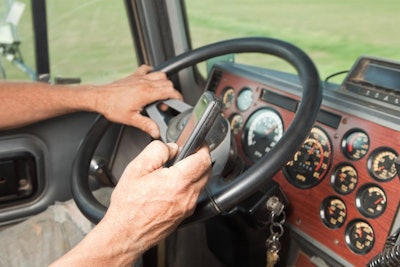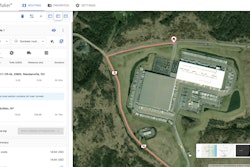
When my brother put a bag phone in his truck in the 1980s no one thought it would potentially increase the risk for accidents. We just thought it was super cool and could prove really helpful.
Fast-forward 35 years and cell phone use in vehicles has become a hot topic among fleets, insurers and parents who remain concerned about how distracting and dangerous cell phone use can be while driving.
Insurers and fleets have been very proactive on this front. My auto insurance company offers an app which can result in a nice discount for safe driving. The app keeps track of phone use, location and harsh braking. My kids were less than thrilled to know that I signed up the entire family.
Interestingly enough, speed isn’t part of our grading lineup but phone use sure is. Under a prior safe driving program with another insurance company, I had to install tracking devices in all of our vehicles, which also measured inertia to keep track of harsh braking. We were also required to download an app to support the system. Phone use was okay so long as it was in hands-free mode.
While our latest program doesn’t penalize us for speed it doesn’t show any mercy for phone use — even if it’s hands-free calling. That’s been tough. As a busy father of four, it’s common to get phone calls from family. Thankfully so far I haven’t missed any critical news that couldn’t wait a bit.
For those accustomed to handling personal and business calls on the road, this can be a tough change but ultimately you’re a safer driver when you can focus more on driving and less on talking.
I’m reminded of a CCJ Innovator story earlier this year on Walmart’s NTransit app which manages driver workflow so drivers can focus more on driving and not have to worry about making phone calls and texting to stay on track.
“Everything is very seamless and painless. It's very painless,” longtime Walmart driver Carol Nixon told me. “You don't have to do any phone calls. I mean, it's right there.”
[Related: Truck safety improving but there's still work to be done]
The NTransit app lays out their workday and offers incoming audio messages only should work or family need to get in touch.
"It's a great way for our drivers to stay connected, for us to manage our business, and to do it safely because obviously we don't want our drivers utilizing their cell phones as they're driving," said Scott Donahue, Walmart’s vice president of supply chain product who led NTransit's development.
Eliminating cell phone use the answer?
Cell phone use has definitely been a big topic of interest at the Insurance Institute for Highway Safety.“Researchers have consistently linked texting or otherwise manipulating a cellphone to increased risk,” IIHS reports on their website. “Some studies, but not all, have found that talking on a cellphone also increases crash risk.”
Yes, that also includes hands-free communication which I’ve been a big fan of for quite some time. But I’m also a fan of saving money. By staying away from cell phone use while driving I’m currently on track for a 25% insurance discount through our safe driving program. My kids were happy to reveal better scores than mine. I honestly thought it would be the other way around but I deal with a pretty full plate that has my phone ringing and pinging.
[Related: Cell phone use blamed for rise in traffic fatalities]
IIHS also goes on to report that other distractions like “adjusting a radio, eating and drinking, reading, grooming and interacting with passengers” can also increase the risk for a crash.
When I was driving in Atlanta traffic last week, there was nothing that would take my mind off driving. The kids will tell you that in addition to white knuckling the wheel I was prone to cussing.
I mostly drive in Panama City and Panama City Beach, Florida, where beach traffic can be annoying but not typically cutthroat. People here are generally in a laidback, Margaritaville state-of-mind whereas folks in A-T-L as they call it are on a constant hardcore mission to change lanes and get somewhere fast: work, home, Walmart, church...it doesn’t matter. Just get out of their way and good luck finding your off ramp.
There was an accident every day on the freeway during our vacation, which created apocalyptic traffic jams. If I’m a truck driver stuck in nutty traffic, I’d like to make a phone call to a loved one or friend for a little stress relief. Studies have also shown that driving under stress increases risk. Surely there’s an ideal balance between communicating and maintaining driver well-being without incurring risk.
Rewarding drivers for not using their cell phones can help take the edge off but ultimately drivers, particularly those on long-haul routes, can benefit from talking with others while on the road.
IIHS has taken a strong stance against cell phone use on the road and goes on to say that “broad bans on manipulating electronic devices seem to be most promising, rather than laws that only target talking or texting.”
Might that ban also include CBs? Can’t conversations over CBs also prove distracting? Seems like it. In fact IIHS also points out that talking with passengers can prove distracting. From personal experience I can definitely attest to that.
Focusing on additional data from drivers and driving conditions might help guide fleet policies regarding cell phone and CB use in trucks. Again, I don’t think it’s a bad idea to reward those who refrain from using electronics. Providing a window for beneficial communication on the road also makes sense. Maybe drivers are comfortable just handling calls during breaks. If so, that’s great.
Mental health experts have also pointed out the benefits of talking to oneself particularly during stressful moments. In a recent article titled ‘Why do people talk to themselves?’ WebMD notes that the practice can be helpful for those in isolation.
“Most people talk to themselves regularly,” the article states. “This may happen when thinking through ideas, when debating decisions, or when in need of a pep talk. Some people feel that self-talk creates a ‘presence’ around them that makes them feel better. This can help with loneliness.”
With advancements in telematics, it’s possible to more closely monitor life on the road and adjust accordingly. If a truck is stopped in traffic or moving below a certain speed and weather’s not a concern, maybe that’s a more ideal time to make a phone call. If the driver’s had a safe driving history, maybe that can help play a role.
As it stands now, I’ve scaled way back on cell phone use when I’m on the road. But I’m typically taking short trips around town. I can’t imagine not using my phone throughout the entire day. I suppose some drivers might welcome the change while others will stress out unless they get their 10,000 or so words in for the day. Finding that right balance for each driver is key.












